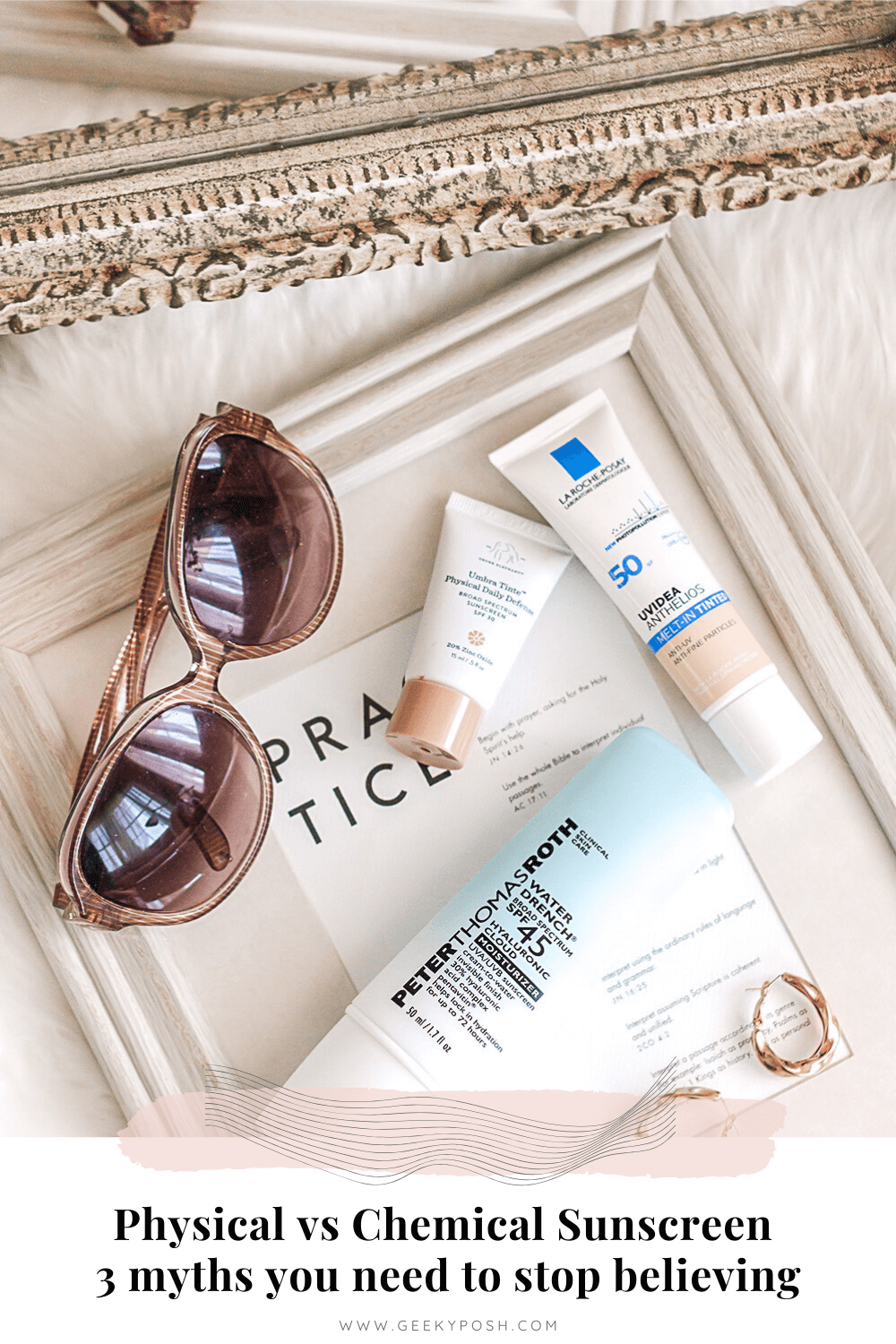Sunscreen, a topic I’m extremely passionate about as I believe that it’s the best anti-aging product we have, when used correctly that is. Sadly there’s a lot of misinformation out there perpetuated by brands and influencers peddling their products, especially when it comes to physical vs chemical sunscreens. Today’s post discusses 3 myths that affect our application and purchases:
1. You can apply less physical sunscreen because…
I get that physical filters can feel thicker so you want to use less but I’m starting to think this is all a lie brands made up so they can trick the consumers. ???? Less goopy sunscreen = more pleasant application = happier consumer. But our skin? Not so happy.
Anyways let’s look at some of the excuses:
“They don’t break down.”
It’s true that some UVA filters are unstable, but a well made formula will use stabilizers to compensate, and almost all European/Asian sunscreens use next generation filters that are already photostable.
Plus, let’s not forget about sweating, oil, and physical contact that can cause both types of sunscreen to come off.
“Physical filters (zinc oxide & titanium dioxide) don’t absorb into the skin.”
It does seem to be the case based on this FDA study, but at the same time it’s important to consider the overall formula. A well formulated sunscreen should actually minimize the absorption, and one method to test is using the spritz method.
Even if some of the chemical sunscreen does get “absorbed”, knowing how much and when is just as important. If it’s 1% after 5 hours (completely hypothetical), the difference in sun protection is minimal given that you’re reapplying regularly. Since we don’t know these numbers, it’s safer to assume the amount absorbed is negligible and that we should apply the same amount even with a physical sunscreen.
But most importantly, we should apply the same amount of sunscreen regardless of filter types because that’s how we get the labeled protection!
All sunscreens are tested using the same amount (2 mg/cm2), so wouldn’t it make sense we apply the same amount? Call me when they start testing physical vs chemical sunscreens differently and I’ll happily edit this post. ????
2. Physical sunscreen is reef-friendly.
Another lie that I think brands started to peddle their products. Of course I don’t want my sunscreen polluting the ocean, but the truth is that zinc oxide can be harmful to coral reefs too.
Now that’s not saying that chemical filters are reef-safe, because oxybenzone and octinoxate have shown to be disruptive as well. So instead of just blindly avoiding chemical sunscreens, avoid ones with the problematic ingredients: zinc oxide, oxybenzone, octinoxate.
Don’t trust the “reef-friendly” label on sunscreens either. These terms are not FDA-regulated, and many actually include the 3 problematic filters, like this Bare Republic Mineral SPF50 Sport.
3. Physical sunscreen is safer for us.
Here we go with the fear mongering, something “clean” brands are notorious for.
Let me say it loud and clear: natural is not better. Plus I don’t know why physical filters are considered “natural” when they’re still made of chemicals, just like everything else. Also poison ivy is natural but we’re not rubbing that on our face are we?
Then there’s the concern that chemical filters get absorbed, which I admit does sound alarming. However the dose makes the poison. So while certain ingredients like homosalate, octocrylene, and oxybenzone have been detected in bloodstream/breast milk/urine, studies that show these having any hormonal effects were done on cells and animals in enormous amounts that no normal person would actually apply. Even the FDA, which did the study on sunscreen absorption, states that absorption does not equal risk.
What is safe is a properly formulated sunscreen that you enjoy using. It could be a physical or chemical one, doesn’t matter, the important thing is that we use enough and use it regularly so that we’re protected from UV rays!
Need tips on how to find a good sunscreen: my ultimate sunscreen guide goes into all the details.



These things need to be repeated over and over again – sunscreen is so important, yet people use it incorrectly or not at all because of these misconceptions.
Anne from Doctor Anne
as someone with combination but acne-prone and sensitive skin, i’ve stopped trying out chemical spf and resorted to finding physical ones until i discovered krave beauty’s beet the sun / the beet shield spf which is a chemical formula but with UV protection ingredients i don’t think has been widely used by other brands yet (i might be wrong though). this is probably the only chemical spf that works on my skin for every day use (i used to use the biore uv aqua rich and i think my skin hated it at some point)
i try my best to stay away from oxybenzone and octinoxate since they’re said to be not as safe for acne-prone skin. not sure how true this is but i watched liah yoo and i really trust her when she said it’s better to use physical spf if one has combo, acne-prone and sensitive/rosacea skin. i didn’t know zinc oxide is bad news for coral reefs though, yikes. but don’t we need both zinc oxide and titanium dioxide in physical spf for full protection, though? i personally always look for physical spf with both TiO and ZnO and will feel unsafe when it’s incomplete.
The filters in The Beet Shield are actually pretty common in Asian/European sunscreen. If your skin is reacting adversely to other sunscreens, it might not just be the filters, but also the inactive ingredients. They could’ve included some skin sensitizing fragrance or comedogenic emollients in there.
Also zinc oxide is the only physical filter that will protect against the full UVB/UVA spectrum, so yes you need it in a physical sunscreen. TiO only protects against UVB and a small part of UVA filters, so you can actually have a physical sunscreen without it and still be ok.
As for which sunscreen is best, ymmv and it depends on the formula as a whole, not just physical vs chemical. I know many people with sensitive acne prone skin but prefer chemical sunscreens instead.
Amen to all of these, Jenny! I kept telling friends and family ‘natural is NOT necessarily better!’ too.
This was so helpful, thank you for sharing these. I have been a little curious about the whole reef safe claim, any chemical could harm the reef! xo
Gemma | Makeup Muddle
Oh girl I learned so much! Thank you! x
Lisa | lisaautumn.com